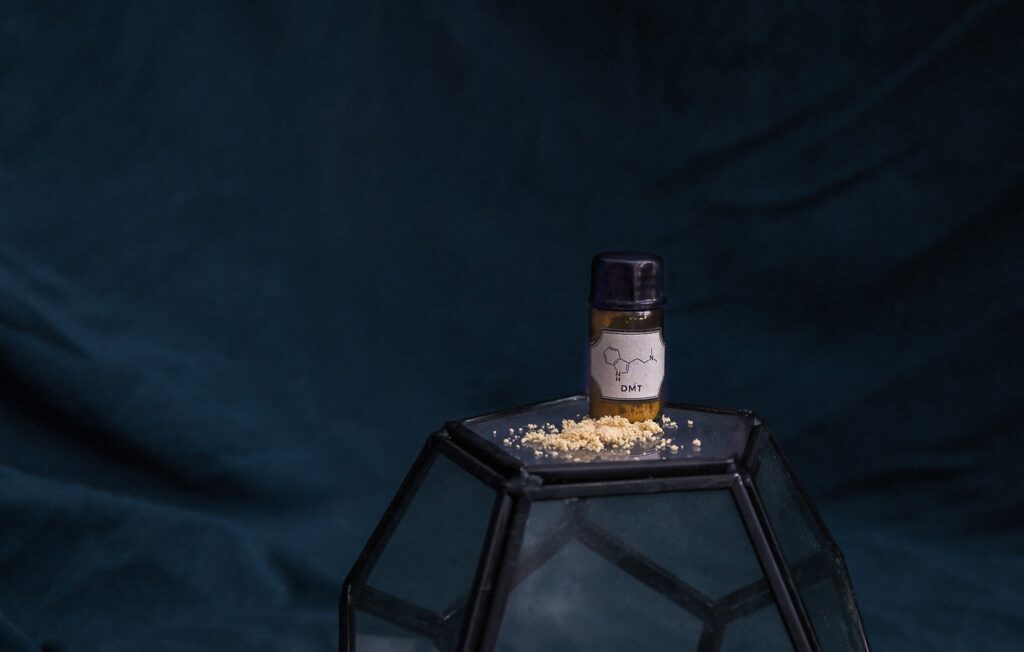How to Integrate a Difficult-to-Remember DMT Experience
This is a guest post from the great Sam Woolfe.
One of the most common features (and frustrations) associated with the DMT experience is that despite being profound, it can also be very difficult to recall. DMT has a dream-like quality to it, in that you quickly lose your memory of the DMT trip as you return to normal waking consciousness. Terence McKenna drew attention to this quality of the experience when he said: “the way a dream melts away is the way a DMT trip melts away,” adding that “[t]here is a self-erasing mechanism in it”.
Image by Pretty Drug Things
Many people who experience DMT, especially at the breakthrough levels, will find that they simply can’t remember the bulk of what they experienced. This is something quite unique to the DMT flash and I think part of it comes down to the extremely ineffable nature of the DMT experience, which you could even call hyper-ineffable, with certain aspects not only being indescribable but also unrememberable.
Some people might accept this is a DMT quirk and think nothing of it, whereas others might feel that a lot of important knowledge and insight was lost when the amnesia set in. Whatever your attitude may be about DMT and memory loss, one challenge remains: how can you integrate a DMT experience that is difficult to remember?
In this article, I’d like to share my own experiences of DMT and memory loss, relating to one experience, in particular, that took place six years ago, but which I still mull over sometimes. This has been my most profound psychedelic experience to date, yet it has also been the most difficult to remember, with essentially most of the trip (apparently) erased from my memory. However, over the years, I have still been able to integrate the experience by way of helpful discussions, enlightening books, and productive introspection. First, here’s a brief description of what my experience was like.
My Mystical DMT Experience
One day, I decided to go on a solo psychedelic journey and took 430mg of mescaline HCL. This experience was highly profound in itself, with emotional and life-affirming insights. It felt like the negativity bias had been flushed out of me, replaced instead by existential joy. At the peak of the experience or perhaps just after, however, I had the thought of smoking DMT. I wanted to aim for a breakthrough.
I got everything ready and, for the first time, I had zero anticipatory fear or anxiety, something that was usually quite prominent any previous time before blasting off. I think the lack of pre-trip jitters (and the mescaline, no doubt) helped me to go deeper into the experience than I otherwise might have.
I was ‘congratulated’ for taking the last hit by some presence or presences, to my amusement. After that, I began to lay down and remember a tsunami of colour and patterns enveloping me. I’m not sure I even remember feeling my body completely lay down; my sense of self and body was snuffed out in an instant.
From this point on, the memories are hazy and sparse. My clearest memory was having what felt to be universal knowledge. Every question was answered. There were no mysteries left to be solved. These insights felt as clear as the understanding that follows when you finally solve a problem you’ve been working on for a long time: the immediate relief of clear understanding. There came a point though where I had to leave this realm of universal knowledge and I was told (or knew) that as I was leaving, I wouldn’t be able to bring this knowledge back with me. The cosmic secrets had to remain in this realm and this realm only. A pity, I thought.
I do have a snapshot memory of then travelling through a psychedelic wormhole or tunnel, ending up in a realm with ever-shifting activity. This activity was going on for what felt like an eternity – I definitely had the sense of being away for aeons and certainly could not imagine that there would be a time or place in which this experience was not happening.
But eventually, I gained some perception of my body, feeling the pressure of the floor against my back. At this point, though, my ‘body’ felt nothing more than pulsating, pleasurable energy – everything about me seemed to have melted into the totality of the experience. As I regained more bodily awareness, at a certain point I opened my eyes, as if in shock. I saw multi-layered DMT-like patterns above me, so I was half in my room, half in this heavenly realm. I closed my eyes again and I was still somewhat back in hyperspace. There were entities engaged in all sorts of frenzied, zany activities.
After opening my eyes a second time, I went into the fetal position and began sobbing, feeling like pure consciousness. I had felt the presence of the divine: this titanic, loving, and merciful force. I had the feeling of being shot out of some cosmic womb, reborn, and given a second chance at life. I was utterly stunned and in disbelief about the whole experience. Slowly, piece-by-piece, I regained my sense of identity and my memories, realising I had a life here on Earth and had returned to it.
After the Experience
I have thought about this experience a lot since it happened six years ago, but one of my personal frustrations has been how little I remember and whether my thoughts about the experience or what I wrote down some time after the experience even approaches what actually occurred.
There are many things, nonetheless, that have helped me to integrate this experience (and other DMT experiences), despite the gaps in memory. Before describing these techniques, I’d first like to touch on why integration has helped me and how it might benefit you, as well.
The Benefits of Integration
Integrating this particular experience has helped me to sort through some of the confusion, such as endless questions and doubts about what certain elements mean. You want to remain mindful after such an intense experience, as there is often a difference between healthy introspection and unhealthy obsessive thinking.
Integration, for me, has been a process of creating a clear and meaningful narrative that benefits my attitudes, beliefs, and actions, rather than forget about the experience as something ineffectual and inconsequential. If you are struggling with memory gaps and confusion about a DMT experience, you may find peace of mind by accepting that the experience is likely to remain deeply mysterious to some degree and will always be open to re-interpretation.
Integration has also motivated me to explore different ideas and belief systems, especially those relating to transpersonal, humanistic, and Jungian psychology, spirituality, mysticism, world religions, and wisdom traditions. In these explorations, I found connections to my DMT experience, which helped to add new meaning to the experience, by providing frameworks in which to interpret it and use it to benefit myself and others.
As an atheist confronted with ‘the divine’, I also felt a need to reconcile my atheistic worldview with this undeniable experience. This is not a process that has finished (which is true of integration, in general), but so far viewing this divine quality and experience as something human and interior (rather than necessarily exterior) has been productive. You may likewise discover that integration will allow you to find more wholeness, through the reconciliation of different aspects of yourself, as well as the expression of unrealised aspects.
6 Ways to Integrate a Difficult-to-Remember Experience
1. Let Integration Happen Organically
What I’ve found is that the process of integrating a DMT experience will happen organically when I stop trying to force interpretations onto it and when I give up obsessing about what I might or might not remember. Often, more memories may arise further down the line or existing memories can become clarified or take on a new meaning.
Integrating a DMT experience that is hard to remember might just require patience, time, and being mindful of any new ways in which the experience seems to influence your thoughts, beliefs, opinions, choices, behaviour, and lifestyle. Integration can be organically going on without you even being aware of it.
2. Read Widely
For me personally, there have also been spontaneous moments of integration or clarity when reading a book, article, or someone else’s trip report. A word, phrase, or sentence can seem to bring a memory into focus, create an emotional reaction that feels meaningful, or elicit some sort of constructive thought or insight.
I can give a few examples of books that seemed to help with the process of integration. One was the sci-fi novel Star Maker (1937) by Olaf Stapledon. It tells the story of a nameless narrator who travels through the cosmos, eventually coming into contact with the ‘Star Maker’, the divine creator of everything. The description of this meeting with the Star Maker helped to clarify my own contact with ‘the divine’ during my DMT experience.
Another book was the novel Narcissus and Goldmund (1930), written by Hermann Hesse. There were just a couple of phrases that reignited my memory of the DMT experience:
“At any rate, Goldmund had shown him that a man destined for high things can dip into the lowest depths of the bloody, drunken chaos of life, and soil himself with much dust and blood, without becoming small and common, without killing the divine spark within himself, that he can err through the thickest darkness without extinguishing the divine light and the creative force inside the shrine of his soul.”
The phrases ‘divine spark’ and ‘divine light’ helped me to recall how, coming out of my DMT experience, I felt that ‘the divine’ was something in me. The reason these phrases stood out to me, pregnant with meaning, might have been because this aspect of ‘divinity’ in the self held some importance that I should pay attention to. While I am still unsure and sceptical about what this inner ‘divine’ quality actually is, I do believe it is a positive quality and that if I can focus on that feeling of the divine, it will lead to greater well-being and more positive experiences and actions.
One more book that I’ve come across that benefited the process of integration was The Idea of the Holy (1917), written by the philosopher and theologian Rudolf Otto. In this book, Otto introduces the concept of the numinous, which stands for ‘the holy’ or ‘the divine’, which Otto conceives in a particular way.
He argued, firstly, that this experience of the divine, the “wholly other”, was at the basis of all religions, something that I understood, based on my experience with DMT. I came out of the experience thinking that my encounter with this powerful force, this divine ‘other’, reminded me of descriptions of prophets or Biblical characters being overwhelmed by the presence of God, such as Moses’ vision of the burning bush and Saul’s Road to Damascus experience, when Jesus appears to him, an experience that was so overwhelmingly powerful it caused Saul to fall to his knees.
Otto describes the experience of the numinous as involving fear, mystery, and fascination. This mixture of fear and fascination towards the power of the divine was very relatable and Otto’s elaboration on the numinous helped me to further clarify my experience, although it still remains shrouded in mystery, which, after all, seems to be an essential quality of this divine presence.
So, if you are struggling to both remember and integrate a DMT experience, I would recommend searching for books, articles, and trip reports that relate to the particular themes of your own experience. Reading fiction, non-fiction, and anecdotes can, when you least expect it, trigger some recall or allow you to look at your experience from a different light, helping you to make sense of it. While you may not remember much of your experience, what you do remember can, as it turns out, contain a great deal of potential for meaning and growth.
3. Talk Openly About It
One of the most effective ways to aid integration, when your experience is difficult to remember, is to talk about it openly with someone else. You can turn around an experience in your head for years and wonder about what it means, but sometimes the perspective of someone else can lead you to conclusions you might not have reached on your own. This is especially true when the person you’re talking to has had similar experiences, is aware of such experiences, or is knowledgeable about areas of psychology – such as transpersonal psychology – which deal with altered states of consciousness.
When I was seeking a therapist one time during a bout of depression, I found someone who specialised in transpersonal psychology and remember thinking this person could help me examine my DMT experiences in more depth. I believed the positive nature of the experience could help me in my depressive state. When I first met the therapist, however, and voiced this intention of mine, the reaction was not what I had hoped for. Rather than view these experiences as meaningful material that could benefit me, she stressed that because I had depression I should not have used psychedelics, that I put myself at risk of harm, and that if I were to continue therapy, I would have to avoid all drug use.
Not only was this response surprising, given her training as a transpersonal psychologist, but it was also anathema to the integration I needed, as it cast the experience in a negative light, with ‘wrongness’ attached to it. I did not see this therapist again. If you are trying to integrate a DMT experience, it is crucial to be selective of who you speak to and to avoid talking about it further if you are met with any judgement. Integration is a highly personal and vulnerable process and so, if other people are to help you in this process, they will need to be open, empathetic, and non-judgemental.
Fortunately, I have seen two other therapists whose attitudes about my DMT experiences were completely different. And I am grateful that I was able to discuss these experiences so openly, especially considering that these therapists were not specifically trained (as far as I’m aware) in psychedelic integration. I talked about some elements of my mystical experience with DMT and my frustration with being unable to remember much of it.
Interestingly, both therapists had similar responses to this frustration of mine. They said something to the effect of “you will remember what is most important about the experience”, with one therapist saying that I was lucky to have had it, as it is a rare experience. I think this helped to make the process of integration much smoother, as it made me realise I didn’t have to obsess about what I do and don’t remember, or regret not being able to remember more, as the most meaningful aspects are still there, and that the experience is something to be immensely grateful for.
Again, even if an experience is hard to remember, this doesn’t mean integration isn’t going on unconsciously, affecting the way you view yourself, others, and the world at large. However, because a lot of this process is unconscious, you may find it beneficial to seek out a therapist who can work with you in becoming aware of this material and processing it, which can be conducive to personal growth.
Others find that psychedelic integration circles offer the ideal environment in which to discuss and make sense of their psychedelic experiences.
4. Write About the Experience
Writing about DMT experiences that are difficult to remember is another great way of trying to integrate them. Fleshing out ideas in writing is a different process than speaking about those ideas. You can write in a stream of consciousness sort of way, writing down whatever thoughts about the experience arise moment-to-moment. You can write in a divergent, creative way, producing as many new and interesting avenues of interpretation as you can and seeing which interpretation for you, subjectively, holds the most meaning and significance.
For me personally, writing – whether that’s privately or publicly in the form of articles – has allowed me to make a lot more sense of my DMT experiences than I think I could achieve through just introspection and conversations with others. For example, when I get some moments of clarity – moments where memories of DMT experiences start flooding into conscious awareness – I have made sure to make a note of that memory, usually as notes on my phone, or in a notepad if I have one nearby. These moments of clarity are fleeting, but trying to capture them in written form can help you create a clearer picture of the DMT experience, even if what you write down seems harder to relate to once the memory fades again.
5. Recreate the Context of the Experience
Context-dependent memory refers to the phenomenon whereby it is easier to retrieve certain memories when the context in which the memory was formed is replicated. For example, if you are struggling to remember what a DMT experience felt like, but you were listening to particular music during the trip, re-listening to that music could help you to retrieve memories of the visual, emotional, and conceptual components of the experience. The more you can do to try to recall the experience, the easier it will be to integrate.
Another aspect of context-dependent memory is state-dependent memory: the phenomenon in which it is easier to recall a memory if you are in the same state – or a similar state – in which the memory was formed. One possible reason DMT experiences can be so hard to remember is that the memories relating to such experiences (or at least some aspects of them, anyway) are state-dependent. So, if you can put yourself in the same physical or mental state in which the memory was formed, or a similar state, you may find it easier to retrieve the memories of the experience in question, which may provide you with valuable information.
You can access state-dependent memories in a variety of ways. One way would be to use DMT again, as this would mentally and physically put you in the same state in which the memory was formed relating to a previous experience. You may not even need to take a high dose, as even a light DMT experience may be similar enough in its quality to trigger the retrieval of memories.
I have not used DMT since my experience six years ago, so I can’t personally speak on the effectiveness of using DMT again to retrieve memories. However, when I occasionally used cannabis in the past, I would have vivid memories – like snapshots of hyperspace, imbued with emotions – of previous DMT experiences (although it’s hard to say which particular experiences they relate to).
Of course, if you don’t use cannabis or don’t want to, this doesn’t mean you can’t retrieve the memories in other ways. I have also remembered DMT experiences under the influence of different psychedelics, as well as experienced short moments of remembering during meditation. It seems that the ‘similar’ state you need to be in to remember a DMT experience can encompass a range of altered states.
6. Prioritise the Emotional Dimension
While many aspects of the DMT experience can be difficult to remember (e.g. the sequence of events and various details), usually one of the strongest impressions of the experience is its emotional quality. It can be easier to question and interpret how the entities and hyperspace appeared to look than how one felt entering hyperspace, traversing hyperspace, and then coming out of hyperspace.
Many strong emotions and feelings may be involved in the DMT experience, such as awe, bliss, euphoria, joy, unconditional love, gratitude, fear, panic, and the feeling of being overwhelmed. By taking the time to really feel into the emotional aspect of these experiences, you can let your mind freely engage with them, seeing what meaning arises.
Emotionally-charged memories may be connected to important insights and lessons. For instance, you might recall how you felt when experiencing love and comfort from the entities during the experience. You may realise that this was connected to greater well-being and so decide for yourself that in order to experience this greater sense of well-being in daily life, it is wise to try to treat yourself just as the entities did. Part of integrating this lesson may involve more attention placed on self-care and self-compassion. This is just one possible interpretation, of course. Integrating the emotional aspect of the DMT experience will always be highly personal.
By prioritising the emotional dimension, you may find you can remember more details of your DMT experience, as well as make more sense of it, offering you some nuggets of wisdom when you least expect it.
A DMT experience might be brief and hard to remember, but it can also be extremely powerful and rich. With patience, self-awareness, and conscious effort, you can unearth meaning and benefits from a single experience over the course of many years.
.
Sam Woolfe is a freelance writer based in London. His main areas of interest include mental health, mystical experiences, the history of psychedelics, and the philosophy of psychedelics. You can follow him on Twitter and find more of his work at www.samwoolfe.com.








